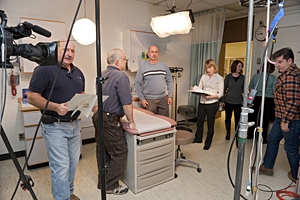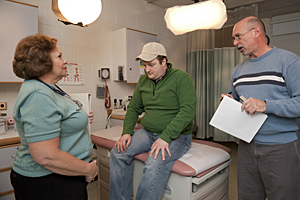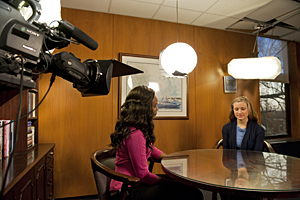
ADVERTISEMENT
- Rozovsky wins prestigious NSF Early Career Award
- UD students meet alumni, experience 'closing bell' at NYSE
- Newark Police seek assistance in identifying suspects in robbery
- Rivlin says bipartisan budget action, stronger budget rules key to reversing debt
- Stink bugs shouldn't pose problem until late summer
- Gao to honor Placido Domingo in Washington performance
- Adopt-A-Highway project keeps Lewes road clean
- WVUD's Radiothon fundraiser runs April 1-10
- W.D. Snodgrass Symposium to honor Pulitzer winner
- New guide helps cancer patients manage symptoms
- UD in the News, March 25, 2011
- For the Record, March 25, 2011
- Public opinion expert discusses world views of U.S. in Global Agenda series
- Congressional delegation, dean laud Center for Community Research and Service program
- Center for Political Communication sets symposium on politics, entertainment
- Students work to raise funds, awareness of domestic violence
- Equestrian team wins regional championship in Western riding
- Markell, Harker stress importance of agriculture to Delaware's economy
- Carol A. Ammon MBA Case Competition winners announced
- Prof presents blood-clotting studies at Gordon Research Conference
- Sexual Assault Awareness Month events, programs announced
- Stay connected with Sea Grant, CEOE e-newsletter
- A message to UD regarding the tragedy in Japan
- More News >>
- March 31-May 14: REP stages Neil Simon's 'The Good Doctor'
- April 2: Newark plans annual 'wine and dine'
- April 5: Expert perspective on U.S. health care
- April 5: Comedian Ace Guillen to visit Scrounge
- April 6, May 4: School of Nursing sponsors research lecture series
- April 6-May 4: Confucius Institute presents Chinese Film Series on Wednesdays
- April 6: IPCC's Pachauri to discuss sustainable development in DENIN Dialogue Series
- April 7: 'WVUDstock' radiothon concert announced
- April 8: English Language Institute presents 'Arts in Translation'
- April 9: Green and Healthy Living Expo planned at The Bob
- April 9: Center for Political Communication to host Onion editor
- April 10: Alumni Easter Egg-stravaganza planned
- April 11: CDS session to focus on visual assistive technologies
- April 12: T.J. Stiles to speak at UDLA annual dinner
- April 15, 16: Annual UD push lawnmower tune-up scheduled
- April 15, 16: Master Players series presents iMusic 4, China Magpie
- April 15, 16: Delaware Symphony, UD chorus to perform Mahler work
- April 18: Former NFL Coach Bill Cowher featured in UD Speaks
- April 21-24: Sesame Street Live brings Elmo and friends to The Bob
- April 30: Save the date for Ag Day 2011 at UD
- April 30: Symposium to consider 'Frontiers at the Chemistry-Biology Interface'
- April 30-May 1: Relay for Life set at Delaware Field House
- May 4: Delaware Membrane Protein Symposium announced
- May 5: Northwestern University's Leon Keer to deliver Kerr lecture
- May 7: Women's volleyball team to host second annual Spring Fling
- Through May 3: SPPA announces speakers for 10th annual lecture series
- Through May 4: Global Agenda sees U.S. through others' eyes; World Bank president to speak
- Through May 4: 'Research on Race, Ethnicity, Culture' topic of series
- Through May 9: Black American Studies announces lecture series
- Through May 11: 'Challenges in Jewish Culture' lecture series announced
- Through May 11: Area Studies research featured in speaker series
- Through June 5: 'Andy Warhol: Behind the Camera' on view in Old College Gallery
- Through July 15: 'Bodyscapes' on view at Mechanical Hall Gallery
- More What's Happening >>
- UD calendar >>
- Middle States evaluation team on campus April 5
- Phipps named HR Liaison of the Quarter
- Senior wins iPad for participating in assessment study
- April 19: Procurement Services schedules information sessions
- UD Bookstore announces spring break hours
- HealthyU Wellness Program encourages employees to 'Step into Spring'
- April 8-29: Faculty roundtable series considers student engagement
- GRE is changing; learn more at April 15 info session
- April 30: UD Evening with Blue Rocks set for employees
- Morris Library to be open 24/7 during final exams
- More Campus FYI >>
11:04 a.m., Dec. 20, 2010----Quality healthcare depends on effective interpersonal exchanges between patients and professionals, but it can be difficult to teach communication skills using traditional media such as lectures and textbooks. Now, a set of interactive videos developed at the University of Delaware promises to provide a more effective approach to preparing current and future healthcare professionals for communicating with their patients.
Perhaps the most unique aspect of the video series, which is being produced and marketed by the F.A. Davis Company in Philadelphia, is the use of theatre students to play the role of standardized patients in more than 20 different scenes.
UD has already pioneered this concept in the classroom through a collaboration between the Department of Theatre and the College of Health Sciences. For the past two years, undergraduate theatre minors have helped future medical professionals learn how to deal with not only the physical symptoms associated with various medical conditions but also the emotional responses of patients and their families.
Touchwood Productions was on campus during the week of Dec. 13 for four days of filming. The resulting two-part instructor and student DVD packages will include video clips demonstrating a variety of basic communication skills -- for example, active listening, reflection, silence, humor, and empathy -- as well as application scenarios with branching options to provide interactive responses to students' choices. The scenarios depict clients in a range of emotional states from anxious and angry to delusional and depressed.
The scripts were written by Cynthia Diefenbeck, assistant professor of nursing, and Kyle Phillips, who earned his bachelor of science degree in nursing in 2004 through UD's accelerated nursing program.
“We're not just following industry standards with this model, we're setting them,” says Diefenbeck, who holds a doctoral degree in clinical psychology. “All of the students benefit from us getting out of our 'silos' -- collaborations like this are the wave of the future.”
Taking part in the video project was a perfect fit for Phillips, who now works as a case manager for a healthcare services company. His first undergraduate degree was in theatre, which he received in 1997 from the State University of New York at Purchase, and he worked as an actor for several years before returning to school to pursue a career in nursing.
In addition to helping write the scripts, Phillips acted in several of the scenes. He said all those involved in the project were especially concerned about making the scripts and the videos realistic and current.
“When I'm working, I've noticed that some people are good at talking with patients, and some aren't,” he said. “It's a wall that some people need help to get over, and that's what we're trying to do.”
The actors were selected, coached and directed by Allan Carlsen, who teaches acting and directing at UD and serves as undergraduate adviser and coordinator in the theatre department.
“Our theatre minors are wonderful actors, and they're eager for chances to perform, so I jumped at the chance to offer them this experience,” he said. “Acting for film is much different from being on stage, so this project is also a wonderful opportunity for them to develop a new skill and work with these production professionals as they learn to do camera work.”
Six undergraduates -- Oluremi Adewole, Lisle Hummerston, Zachary Jackson, Emily Jonas, My Nguyen and Candice Pryce -- and a graduate student from the Professional Theatre Training Program, Donte Fitzgerald, played various roles in the videos.
The students will have the finished videos to include in their professional portfolios as well, Carlsen said, making the project “a terrific way to showcase them and the University.”
Because the producers wanted to include a variety of ages in the videos, a few non-students also played roles in the scenarios, including Phillips, Diefenbeck, and Linda and Kevin Henker, who are supporters of the theatre department.
A retired nurse, Linda Henker recalls finishing her R.N. training and being thrust into the clinical environment with no experience at interacting with patients. “This program takes nursing education to new heights,” she said.
Betty Paulanka, professor emeritus and former dean of the College of Health Sciences who conceptualized the project, agreed that interpersonal skills are an important element of healthcare.
“I think that with the recent emphasis on technology, we have to be especially careful not to forget communication skills,” she said. “If nurses and other healthcare professionals can't communicate well, patients aren't going to get better.”
Article by Diane Kukich and Ann Manser
Photos by Evan Krape




